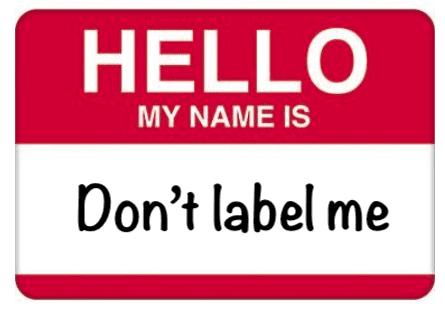Several things have been difficult about returning to America. One is the heightened impatience for labels, categories, and stereotypes (I use that word in a neutral sense). Americans seem a bit schizophrenic when it comes to their claims about identity.
On the one hand, people wave the banner of group identity (e.g., ethnic, gender, sexuality, or place of origin). On the other hand, everyone claims to be an “individual” and seems to get angry when you speak about them in broad terms. “Don’t label me!” or something similar is the constant refrain.
Outside of the West (especially North America), people are far more comfortable with such labels. Mainland Chinese have no problem calling themselves “yellow” and referring to non-Chinese as “foreigners.” Neither of those ways of speaking would pass muster in America.
Ironically, this penchant against broad descriptors and labels actually runs counter to basic human neurology. For the sake of efficiency, the mind literally cannot help but think in broad generalizations, lest we be too slow in protecting ourselves when quick decisions are needed. Such quick judgments are the brain’s default. It must be strategic about what it thinks about in a slower, more measured way.
What does all this have to do with anything? It has everything to do with being the Church and working with others in ministry. (This is part 3 in a series. Check out part 1 and part 2).
Perception is Reality?
I’ve always hated the phrase, “Their perception is their reality.” I want to reply, “No, reality is reality, regardless of what they perceive.” That’s certainly true ultimately, but it misses the point. All people speak and behave according to their perception of reality. Therefore, we ignore our and others’ perceptions at our own peril.
(For some people, this might begin with recognizing that your own perception is not necessarily reality. But that requires tremendous humility.)
In Winsome Conviction: Disagreeing without Dividing the Church, Meuhlhoff and Langer highlight several implications of our brain’s limited capacity to make holistic judgments about everything we experience efficiently. Our brains are energy misers. This is why we resort to categorizing or creating sweeping characterizations. Rather than deny this fact, let’s own it and consider what we can do about it.
The authors point out “that our categories are not value free, but rather each category is colored with implicit bias and discrimination” (93). We categorize people in far more diverse ways than “black/white,” “male/female,” etc. We are just as likely to stereotype people in other denominations and organizations or who have different philosophies of ministry.
What values are driving our characterizations?
To answer that question, we need to be cognizant of our own beliefs and assumptions about ourselves and others, especially the groups we belong to. How do hidden beliefs and assumptions impact the tone we use when speaking with people? And as most of us know, the right tone has an incredible influence on our ability to learn from one another.
Wrong tone = closed minds.
Perceptions of Us and Them
Our propensity to relate only to people who think like us has adverse effects. One is that our mental categories fossilize. Having so little interaction with people with different perspectives effectively permits us to think about those “others” in hyper-generic terms.
After all, little in our experience says otherwise. Naturally, we then attribute increasingly negative assumptions and motives to those with whom we disagree. What’s more, our inner group conversations are not likely to paint a generous picture of our “opponents.” Consequently, “how you talk about people privately is how you’ll treat them publicly” (116).
So, what can we do when discussing our disagreements? Meuhlhoff and Langer write,
“As followers of Jesus, our goal isn’t to ensure our particular group holds on to power or wins at all costs. Rather, it’s that we address a potentially divisive issue in a fair manner that ultimately brings honor to Christ. If your group is wrong on the particulars of an issue, better to receive it and make necessary corrections.” (117)
“But what if our group is right?!” you might ask. Well, that’s precisely the wrong question. Several other questions are much better starting points. A few include: “How might they be right?” “What might I have wrong?” and “What common ground do we share?”
In the next and final post of the series, we’ll look at some strategies for managing controversial issues and learning to rethink old ideas.












